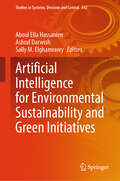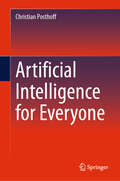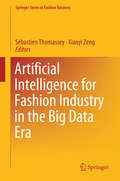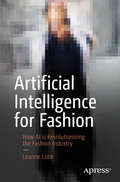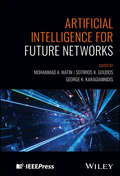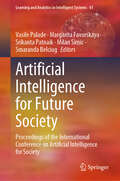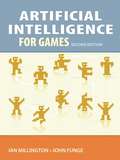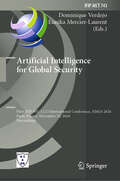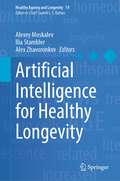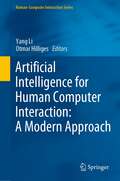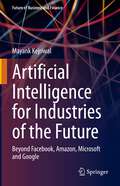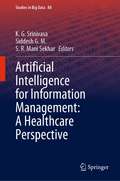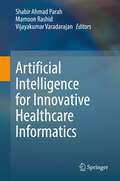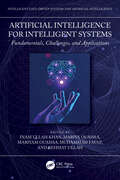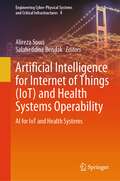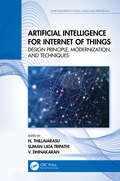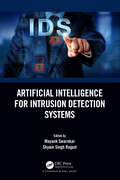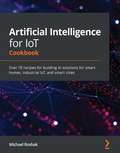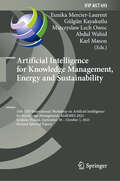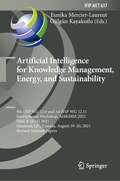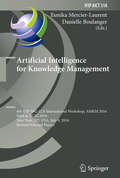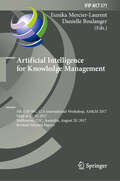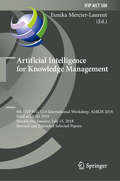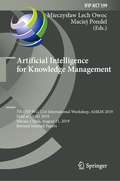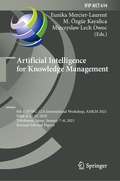- Table View
- List View
Artificial Intelligence for Environmental Sustainability and Green Initiatives (Studies in Systems, Decision and Control #542)
by Ashraf Darwish Aboul Ella Hassanien Sally M. ElghamrawyThis book discusses AI's applications in sustainability, exploring its potential in sectors such as energy, healthcare, agriculture, transportation, and waste management. Discusses applications and innovations in Green Initiatives such as energy, finance, and drug discovery. Highlights the ethical challenges and benefits of integrating AI into sustainability initiatives
Artificial Intelligence for Everyone
by Christian PosthoffThis book demystifies the topic of Artificial Intelligence for readers of varying backgrounds. The content should enable many people to discuss and follow ongoing developments in an informed way, to draw conclusions for their own life and workplace and to acquire the necessary new knowledge. The book strives to provide basic knowledge that will objectify the discussions and relieve some of the creepiness of utopian films. It must also be understood that research results are a necessary condition for progress; they are not sufficient until they can be translated into practice embedded in programs. This difficult relationship between theory and practice has been known for a long time.
Artificial Intelligence for Fashion Industry in the Big Data Era (Springer Series in Fashion Business)
by Sébastien Thomassey Xianyi ZengThis book provides an overview of current issues and challenges in the fashion industry and an update on data-driven artificial intelligence (AI) techniques and their potential implementation in response to those challenges. Each chapter starts off with an example of a data-driven AI technique on a particular sector of the fashion industry (design, manufacturing, supply or retailing), before moving on to illustrate its implementation in a real-world application
Artificial Intelligence for Fashion: How AI is Revolutionizing the Fashion Industry
by Leanne LuceLearn how Artificial Intelligence (AI) is being applied in the fashion industry. With an application focused approach, this book provides real-world examples, breaks down technical jargon for non-technical readers, and provides an educational resource for fashion professionals. The book investigates the ways in which AI is impacting every part of the fashion value chain starting with product discovery and working backwards to manufacturing. Artificial Intelligence for Fashion walks you through concepts, such as connected retail, data mining, and artificially intelligent robotics. Each chapter contains an example of how AI is being applied in the fashion industry illustrated by one major technological theme. There are no equations, algorithms, or code. The technological explanations are cumulative so you'll discover more information about the inner workings of artificial intelligence in practical stages as the book progresses. What You’ll LearnGain a basic understanding of AI and how it is used in fashionUnderstand key terminology and concepts in AIReview the new competitive landscape of the fashion industryConceptualize and develop new ways to apply AI within the workplaceWho This Book Is ForFashion industry professionals from designers, managers, department heads, and executives can use this book to learn about how AI is impacting roles in every department and profession.
Artificial Intelligence for Future Networks
by Mohammad A. Matin George K. Karagiannidis Sotirios K. GoudosAn exploration of connected intelligent edge, artificial intelligence, and machine learning for B5G/6G architecture Artificial Intelligence for Future Networks illuminates how artificial intelligence (AI) and machine learning (ML) influence the general architecture and improve the usability of future networks like B5G and 6G through increased system capacity, low latency, high reliability, greater spectrum efficiency, and support of massive internet of things (mIoT). The book reviews network design and management, offering an in-depth treatment of AI oriented future networks infrastructure. Providing up-to-date materials for AI empowered resource management and extensive discussion on energy-efficient communications, this book incorporates a thorough analysis of the recent advancement and potential applications of ML and AI in future networks. Each chapter is written by an expert at the forefront of AI and ML research, highlighting current design and engineering practices and emphasizing challenging issues related to future wireless applications. Some of the topics include: Signal processing and detection, covering preprocess and level signals, transform signals and extract features, and training and deploying AI models and systemsChannel estimation and prediction, covering channel characteristics, modeling, and classic learning-aided and AI-aided estimation techniquesResource allocation, covering resource allocation optimization and efficient power consumption for different computing paradigms such as Cloud, Edge, Fog, IoT, and MECAntenna design using AI, covering basics of antennas, EM simulator/optimization algorithms, and surrogate modeling Identifying technical roadblocks and sharing cutting-edge research on developing methodologies, Artificial Intelligence for Future Networks is an essential reference on the subject for professionals and researchers involved in the field of wireless communications and networks, along with graduate and PhD students in electrical and computer engineering programs of study.
Artificial Intelligence for Future Society: Proceedings of the International Conference on Artificial Intelligence for Society (Learning and Analytics in Intelligent Systems #41)
by Vasile Palade Srikanta Patnaik Margarita Favorskaya Smaranda Belciug Milan Simic"Artificial Intelligence for Future Society" presents the revolution in future societies by enhancing efficiency, connectivity, and personalization across various sectors. Its future aspects include the integration of AI in everyday life through smart cities, autonomous vehicles, and advanced healthcare systems, providing a more intelligent, responsive, and adaptive environment that meets the evolving needs of humanity. This volume explores the most recent innovations and significant developments in the domains of Artificial Intelligence and its impact in transforming society, propelling innovation across diverse fields such as healthcare, education, finance, and transportation. It spans a wide range of dimensions, including: Societal Diversity Innovation in the Digital Age Business Information Systems Advancement in Healthcare, HSI, and Global Collaboration By merging cutting-edge theoretical insights with practical applications, this volume provides researchers, practitioners, and students with the essential knowledge and tools to explore and advance within the dynamic field of Artificial Intelligence. Artificial Intelligence brings numerous benefits to society, including improved efficiency and productivity in various industries through automation and intelligent data analysis. It enhances healthcare with advanced diagnostic tools and personalized treatment plans, and provides smarter living environments through smart cities and innovative technologies.
Artificial Intelligence for Games
by Ian Millington John FungeCreating robust artificial intelligence is one of the greatest challenges for game developers, yet the commercial success of a game is often dependent upon the quality of the AI. In this book, Ian Millington brings extensive professional experience to the problem of improving the quality of AI in games. He describes numerous examples from real games and explores the underlying ideas through detailed case studies. He goes further to introduce many techniques little used by developers today. The book's associated web site contains a library of C++ source code and demonstration programs, and a complete commercial source code library of AI algorithms and techniques. "Artificial Intelligence for Games - 2nd edition" will be highly useful to academics teaching courses on game AI, in that it includes exercises with each chapter. It will also include new and expanded coverage of the following: AI-oriented gameplay; Behavior driven AI; Casual games (puzzle games).
Artificial Intelligence for Global Security: First IFIP WG 12.13 International Conference, AI4GS 2024, Paris, France, November 19, 2024, Proceedings (IFIP Advances in Information and Communication Technology #743)
by Eunika Mercier-Laurent Dominique VerdejoThis book constitutes the proceedings of the First WG 12.13 International Conference on Artificial Intelligence for Global Security, AI4GS 2024, which took place in Paris, France, on November 19, 2024. The 14 full papers included in these proceedings were carefully reviewed and selected from 45 submissions. They deal with artificial intelligence for global security focusing on defense, homeland security, cyber security, regulation, and financial security.
Artificial Intelligence for Healthy Longevity (Healthy Ageing and Longevity #19)
by Alexey Moskalev Ilia Stambler Alex ZhavoronkovThis book reviews the state-of-the-art efforts to apply machine learning and AI methods for healthy aging and longevity research, diagnosis, and therapy development. The book examines the methods of machine learning and their application in the analysis of big medical data, medical images, the creation of algorithms for assessing biological age, and effectiveness of geroprotective medications.The promises and challenges of using AI to help achieve healthy longevity for the population are manifold. This volume, written by world-leading experts working at the intersection of AI and aging, provides a unique synergy of these two highly prominent fields and aims to create a balanced and comprehensive overview of the application methodology that can help achieve healthy longevity for the population.The book is accessible and valuable for specialists in AI and longevity research, as well as a wide readership, including gerontologists, geriatricians, medical specialists, and students from diverse fields, basic scientists, public and private research entities, and policy makers interested in potential intervention in degenerative aging processes using advanced computational tools.
Artificial Intelligence for Human Computer Interaction: A Modern Approach (Human–Computer Interaction Series)
by Yang Li Otmar HilligesThis edited book explores the many interesting questions that lie at the intersection between AI and HCI. It covers a comprehensive set of perspectives, methods and projects that present the challenges and opportunities that modern AI methods bring to HCI researchers and practitioners. The chapters take a clear departure from traditional HCI methods and leverage data-driven and deep learning methods to tackle HCI problems that were previously challenging or impossible to address.It starts with addressing classic HCI topics, including human behaviour modeling and input, and then dedicates a section to data and tools, two technical pillars of modern AI methods. These chapters exemplify how state-of-the-art deep learning methods infuse new directions and allow researchers to tackle long standing and newly emerging HCI problems alike. Artificial Intelligence for Human Computer Interaction: A Modern Approach concludes with a section on Specific Domains which covers a set of emerging HCI areas where modern AI methods start to show real impact, such as personalized medical, design, and UI automation.
Artificial Intelligence for Industries of the Future: Beyond Facebook, Amazon, Microsoft and Google (Future of Business and Finance)
by Mayank KejriwalThis book provides a brief synthesis of the known implementations, opportunities and challenges at the intersection of artificial intelligence (AI) and modern industry beyond the big-four companies that traditionally consume and produce such advanced technology: Facebook, Amazon, Microsoft and Google. With this information, the author also makes some reasonable claims about the role of AI in future industries. The book draws on a broad range of material, including reports from consulting firms, published surveys, academic papers and books, and expert knowledge available to the author due to numerous collaborations in academia and industry on AI. It is rigorous rather than speculative, drawing on known findings and expert summaries, where available. This provides industry leaders and other interested stakeholders with an accessible review of contemporary perspectives on AI’s forward-looking role in industry as well as a clarifying guide on the major issues that companies are likely to face as they commence on this exciting path.Examines the likely role of AI in industries of the future, both known and unknownPresents use-cases of AI currently being explored across Big Tech, multi-national corporations and start-upsExplores the regulation of AI and its potential impacts on the workforce
Artificial Intelligence for Information Management: A Healthcare Perspective (Studies in Big Data #88)
by K. G. Srinivasa Siddesh G. M. S. R. Mani SekharThis book discusses the advancements in artificial intelligent techniques used in the well-being of human healthcare. It details the techniques used in collection, storage and analysis of data and their usage in different healthcare solutions. It also discusses the techniques of predictive analysis in early diagnosis of critical diseases. The edited book is divided into four parts – part A discusses introduction to artificial intelligence and machine learning in healthcare; part B highlights different analytical techniques used in healthcare; part C provides various security and privacy mechanisms used in healthcare; and finally, part D exemplifies different tools used in visualization and data analytics.
Artificial Intelligence for Innovative Healthcare Informatics
by Shabir Ahmad Parah Mamoon Rashid Vijayakumar VaradarajanThere are several popular books published in Healthcare Computational Informatics like Computational Bioengineering and Bioinformatics (2020), Springer; Health Informatics (2017), Springer; Health Informatics Vision: From Data via Information to Knowledge (2019), IOS Press; Data Analytics in Biomedical Engineering and Healthcare (2020), Elsevier. However, in all these mentioned books, the challenges in Biomedical Imaging are solved in one dimension by use of any specific technology like Image Processing, Machine Learning or Computer Aided Systems. In this book, the book it has been attempted to bring all technologies related to computational analytics together and apply them on Biomedical Imaging.
Artificial Intelligence for Intelligent Systems: Fundamentals, Challenges, and Applications (Intelligent Data-Driven Systems and Artificial Intelligence)
by Mariya Ouaissa Mariyam Ouaissa Inam Ullah Khan Muhammad Fayaz Rehmat UllahThe aim of this book is to highlight the most promising lines of research, using new enabling technologies and methods based on AI/ML techniques to solve issues and challenges related to intelligent and computing systems. Intelligent computing easily collects data using smart technological applications like IoT-based wireless networks, digital healthcare, transportation, blockchain, 5.0 industry and deep learning for better decision making. AI enabled networks will be integrated in smart cities' concept for interconnectivity. Wireless networks will play an important role. The digital era of computational intelligence will change the dynamics and lifestyle of human beings. Future networks will be introduced with the help of AI technology to implement cognition in real-world applications. Cyber threats are dangerous to encode information from network. Therefore, AI-Intrusion detection systems need to be designed for identification of unwanted data traffic.This book: Provides a better understanding of artificial intelligence-based applications for future smart cities Presents a detailed understanding of artificial intelligence tools for intelligent technologies Showcases intelligent computing technologies in obtaining optimal solutions using artificial intelligence Discusses energy-efficient routing protocols using artificial intelligence for Flying ad-hoc networks (FANETs) Covers machine learning-based Intrusion detection system (IDS) for smart grid It is primarily written for senior undergraduate, graduate students, and academic researchers in the fields of electrical engineering, electronics and communication engineering, and computer engineering.
Artificial Intelligence for Internet of Things: AI for IoT and Health Systems (Engineering Cyber-Physical Systems and Critical Infrastructures #8)
by Alireza Souri Salaheddine BendakIoTHIC-2023 is a multidisciplinary, peer-reviewed international conference on Internet of Things (IoT) and healthcare systems with Artificial Intelligence (AI) techniques such as data mining, machine learning, image processing, and meta-heuristic algorithms. The AI-based techniques are applied on many fields of healthcare systems, including predicting and detecting diseases in hospitals, clinics, smart health monitoring systems, surgery, medical services, and etc.
Artificial Intelligence for Internet of Things: Design Principle, Modernization, and Techniques (Smart Engineering Systems)
by Suman Lata Tripathi N Thillaiarasu V DhinakaranThe text comprehensively discusses the essentials of the Internet of Things (IoT), machine learning algorithms, industrial and medical IoT, robotics, data analytics tools, and technologies for smart cities. It further covers fundamental concepts, advanced tools, and techniques, along with the concept of energy-efficient systems. It also highlights software and hardware interfacing into the IoT platforms and systems for better understanding. It will serve as an ideal reference text for senior undergraduate, graduate students, and academic researchers in the fields of electrical engineering, electronics and communication engineering, and computer engineering. Features: Covers cognitive Internet of Things and emerging network, IoT in robotics, smart cities, and health care Discusses major issues in the field of the IoTsuch as scalable and secure issues, energy-efficient, and actuator devices Highlights the importance of industrial and medical IoT Illustrates applications of the IoT in robotics, smart grid, and smart cities Presents real-time examples for better understanding The text comprehensively discusses design principles, modernization techniques, advanced developments in artificial intelligence.This will be helpful for senior undergraduates, graduate students, and academic researchers in diverseengineering fields including electrical, electronics and communication, and computer science.
Artificial Intelligence for Intrusion Detection Systems
by Mayank Swarnkar Shyam Singh RajputThis book is associated with the cybersecurity issues and provides a wide view of the novel cyber attacks and the defense mechanisms, especially AI-based Intrusion Detection Systems (IDS).Features: • A systematic overview of the state-of-the-art IDS• Proper explanation of novel cyber attacks which are much different from classical cyber attacks• Proper and in-depth discussion of AI in the field of cybersecurity• Introduction to design and architecture of novel AI-based IDS with a trans- parent view of real-time implementations• Covers a wide variety of AI-based cyber defense mechanisms, especially in the field of network-based attacks, IoT-based attacks, multimedia attacks, and blockchain attacks. This book serves as a reference book for scientific investigators who need to analyze IDS, as well as researchers developing methodologies in this field. It may also beused as a textbook for a graduate-level course on information security.
Artificial Intelligence for IoT Cookbook: Over 70 recipes for building AI solutions for smart homes, industrial IoT, and smart cities
by Michael RoshakImplement machine learning and deep learning techniques to perform predictive analytics on real-time IoT dataKey FeaturesDiscover quick solutions to common problems that you'll face while building smart IoT applicationsImplement advanced techniques such as computer vision, NLP, and embedded machine learningBuild, maintain, and deploy machine learning systems to extract key insights from IoT dataBook DescriptionArtificial intelligence (AI) is rapidly finding practical applications across a wide variety of industry verticals, and the Internet of Things (IoT) is one of them. Developers are looking for ways to make IoT devices smarter and to make users' lives easier. With this AI cookbook, you'll be able to implement smart analytics using IoT data to gain insights, predict outcomes, and make informed decisions, along with covering advanced AI techniques that facilitate analytics and learning in various IoT applications. Using a recipe-based approach, the book will take you through essential processes such as data collection, data analysis, modeling, statistics and monitoring, and deployment. You'll use real-life datasets from smart homes, industrial IoT, and smart devices to train and evaluate simple to complex models and make predictions using trained models. Later chapters will take you through the key challenges faced while implementing machine learning, deep learning, and other AI techniques, such as natural language processing (NLP), computer vision, and embedded machine learning for building smart IoT systems. In addition to this, you'll learn how to deploy models and improve their performance with ease. By the end of this book, you'll be able to package and deploy end-to-end AI apps and apply best practice solutions to common IoT problems.What you will learnExplore various AI techniques to build smart IoT solutions from scratchUse machine learning and deep learning techniques to build smart voice recognition and facial detection systemsGain insights into IoT data using algorithms and implement them in projectsPerform anomaly detection for time series data and other types of IoT dataImplement embedded systems learning techniques for machine learning on small devicesApply pre-trained machine learning models to an edge deviceDeploy machine learning models to web apps and mobile using TensorFlow.js and JavaWho this book is forIf you're an IoT practitioner looking to incorporate AI techniques to build smart IoT solutions without having to trawl through a lot of AI theory, this AI IoT book is for you. Data scientists and AI developers who want to build IoT-focused AI solutions will also find this book useful. Knowledge of the Python programming language and basic IoT concepts is required to grasp the concepts covered in this artificial intelligence book more effectively.
Artificial Intelligence for Knowledge Management, Energy and Sustainability: 10th IFIP International Workshop on Artificial Intelligence for Knowledge Management, AI4KMES 2023, Krakow, Poland, September 30–October 1, 2023, Revised Selected Papers (IFIP Advances in Information and Communication Technology #693)
by Eunika Mercier-Laurent Abdul Wahid Gülgün Kayakutlu Mieczyslaw Lech Owoc Karl MasonThis volume IFIP AICT 693 constitutes the refereed proceedings of the 10th IFIP International Workshop on Artificial Intelligence for Knowledge Management, AI4KMES 2023, from September 30th – October 1st, 2023, held in Krakow, Poland. The 15 full papers presented together with 2 short papers were carefully reviewed and selected from 49 submissions. The accepted papers covered a large scope of topics related to sustainability in various contexts such as smart cities, agriculture, energy and gas production and distribution, industry, management and biodiversity.
Artificial Intelligence for Knowledge Management, Energy, and Sustainability: 9th IFIP WG 12.6 and 1st IFIP WG 12.11 International Workshop, AI4KMES 2021, Held at IJCAI 2021, Montreal, QC, Canada, August 19–20, 2021, Revised Selected Papers (IFIP Advances in Information and Communication Technology #637)
by Eunika Mercier-Laurent Gülgün KayakutluThis book features a selection of extended papers presented at the 9th IFIP WG 12.6 International Workshop on Artificial Intelligence for Knowledge Management, AI4KM 2021, and the 1st International Workshop on Energy and Sustainability, AIES 2021, named AI4KMES 2021 and held in conjunction with IJCAI 2021 in August 2021. The conference was planned to take place in Montréal, Canada, but changed to an online event due to the COVID-19 pandemic. The 15 papers included in this book were carefully reviewed and selected from 17 submissions. They deal with knowledge management and sustainability challenges, focusing on methodological, technical and organizational aspects of AI used for facing related complex problems. This year's topic was AI for Knowledge Management, Energy and Sustainable Future.
Artificial Intelligence for Knowledge Management: 4th IFIP WG 12.6 International Workshop, AI4KM 2016, Held at IJCAI 2016, New York, NY, USA, July 9, 2016, Revised Selected Papers (IFIP Advances in Information and Communication Technology #518)
by Eunika Mercier-Laurent Danielle BoulangerThis book features a selection of papers presented at the 4th IFIP WG 12.6 International Workshop on Artificial Intelligence for Knowledge Management, AI4KM 2016, held in New York, USA, in July 2016, in the framework of the International Joint Conference on Artificial Intelligence, IJCAI 2016. The 9 revised and extended papers were carefully reviewed and selected from 16 submissions. They present new research and innovative aspects in the field of knowledge management such as machine learning, knowledge models, KM and Web, knowledge capturing and learning, and KM and AI intersections.
Artificial Intelligence for Knowledge Management: 5th IFIP WG 12.6 International Workshop, AI4KM 2017, Held at IJCAI 2017, Melbourne, VIC, Australia, August 20, 2017, Revised Selected Papers (IFIP Advances in Information and Communication Technology #571)
by Eunika Mercier-Laurent Danielle BoulangerThis book features a selection of extended papers presented at the 5th IFIP WG 12.6 International Workshop on Artificial Intelligence for Knowledge Management, AI4KM 2017, held in Melbourne, VIC, Australia, in August 2017, in the framework of the International Joint Conference on Artificial Intelligence, IJCAI 2017. The 11 revised and extended papers were carefully reviewed and selected for inclusion in this volume. They present new research and innovative aspects in the field of knowledge management such as machine learning, knowledge models, KM and Web, knowledge capturing and learning, and KM and AI intersections.
Artificial Intelligence for Knowledge Management: 6th IFIP WG 12.6 International Workshop, AI4KM 2018, Held at IJCAI 2018, Stockholm, Sweden, July 15, 2018, Revised and Extended Selected Papers (IFIP Advances in Information and Communication Technology #588)
by Eunika Mercier-LaurentThis book features a selection of extended papers presented at the 6th IFIP WG 12.6 International Workshop on Artificial Intelligence for Knowledge Management, AI4KM 2018, held in Stockholm, Sweden, in July 2018, in the framework of the International Joint Conference on Artificial Intelligence, IJCAI 2018.The 11 revised and extended papers were carefully reviewed and selected for inclusion in this volume. They present new research and innovative aspects in the field of knowledge management such as machine learning, knowledge models, KM and Web, knowledge capturing and learning, and KM and AI intersections.
Artificial Intelligence for Knowledge Management: 7th IFIP WG 12.6 International Workshop, AI4KM 2019, Held at IJCAI 2019, Macao, China, August 11, 2019, Revised Selected Papers (IFIP Advances in Information and Communication Technology #599)
by Mieczysław Lech Owoc Maciej PondelThis book features a selection of extended papers presented at the 7th IFIP WG 12.6 International Workshop on Artificial Intelligence for Knowledge Management, AI4KM 2019, held in Macao, China, in August 2019, in the framework of the International Joint Conference on Artificial Intelligence, IJCAI 2019.The 8 revised and extended papers were carefully reviewed and selected for inclusion in this volume. They present new research and innovative aspects in the field of knowledge management such as machine learning, knowledge models, KM and Web, knowledge capturing and learning, and KM and AI intersections.
Artificial Intelligence for Knowledge Management: 8th IFIP WG 12.6 International Workshop, AI4KM 2021, Held at IJCAI 2020, Yokohama, Japan, January 7–8, 2021, Revised Selected Papers (IFIP Advances in Information and Communication Technology #614)
by Eunika Mercier-Laurent M. Özgür Kayalica Mieczyslaw Lech OwocThis book features a selection of extended papers presented at the 8th IFIP WG 12.6 International Workshop on Artificial Intelligence for Knowledge Management, AI4KM 2021, held in Yokohama, Japan, in January 2021, in the framework of the International Joint Conference on Artificial Intelligence, IJCAI 2020.*The 14 revised and extended papers presented together with an invited talk were carefully reviewed and selected for inclusion in this volume. They present new research and innovative aspects in the field of knowledge management and discuss methodological, technical and organizational aspects of artificial intelligence used for knowledge management.*The workshop was held virtually.
